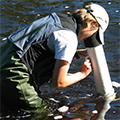Engaging Citizen Scientists to Evaluate Water Quality Decline
 Engaging Citizen Scientists to Evaluate the Potential for Water Quality Decline in Maine Lakes: A Social Science-Physical Science Collaboration for Lake Stewardship
Engaging Citizen Scientists to Evaluate the Potential for Water Quality Decline in Maine Lakes: A Social Science-Physical Science Collaboration for Lake Stewardship
Institutions: University of Maine, University of Southern Maine
Sponsor: Senator George J. Mitchell Center for Sustainability Solutions
This collaborative project conducts a focused study of 20 Maine lakes to (a) develop a lake Vulnerability Index that combines both stakeholder engagement parameters and physical indicators to predict which lakes are more susceptible to deterioration in water quality, (b) identify, through surveys and interviews, the underlying factors that encourage successful collaborations among Volunteer Lake Monitoring Program monitors, homeowners, and lake associations on lake stewardship activities, and (c) use data collected through this study to develop a blueprint of activities that can positively influence stewardship behaviors among the public.
Maine lakes are landscape gems and home to a diversity of fish and wildlife. They provide enormous economic, social, recreational, and aesthetic benefits to the people of Maine and millions of annual visitors. Unfortunately, many lakes in Maine are experiencing declining water quality due to eutrophication, which not only causes deleterious effects on the overall health of the ecosystem, but also diminishes the economic benefits of recreational use in addition to shorefront property values, and thus, tax revenues. In cases where the lake is used by the community as a drinking water source, loss in water quality also results in significantly higher treatment costs.
In most lake systems, phosphorus (P) is the limiting nutrient. P is delivered to the lake from tributaries and atmospheric deposition, or recycled from the sediment; available P in the water column leads to algal growth. Upon death, algae sink, decompose, and deplete oxygen in the deep waters of the lake. This process, if accelerated, leads to lake eutrophication. In addition to increased land development in a lake’s watershed, climate change, especially early ice-out, increasing average water temperatures, longer growing season and escalating storm intensity are important factors that have directly or indirectly accelerated lake eutrophication in recent years.
Project goals:
- Survey VLMP monitors and lake associations to assess lake stewardship activities and engagement and record successes and problem areas across 20 lakes
- Interview key VLMP monitors to assess their level of engagement in stewardship activities and assess the role and involvement of VLMP monitors in the long-term success of lake associations
- Engage VLMP monitors in the collection of sediment samples in addition to traditional water quality data from the 20 study lakes
- Develop a comprehensive Vulnerability Index that includes both stakeholder engagement and
physical parameters for 20 lakes in Maine based on data gathered through this project - Conduct workshops with VLMP volunteers and staff, PIs, several lake associations and interested lake groups toward the end of the project to (a) share key results of the interview process, particularly social strategies that promoted local lake stewardship, (b) in understandable terms, explain how Maine lakes function with respect to P loading, (c) discuss future data needs, both social and physical (water temperature, oxygen, chemistry, and sediment collection and processing), (d) suggest best management practices for a given lake and its watershed, and (d) have participants develop a strategy to reach out and engage additional lake associations in future stewardship activities
- Identify external funding sources to scale up this project to test the reliability of the Vulnerability Index and refine it
Team Leader:
Aria Amirbahman, Civil and Environmental Engineering, UMaine
Team Members:
Stephen Norton, Earth and Climate Sciences, UMaine;
Firooza Pavri, Geography-Anthropology, USM
Partners:
Linda Bacon, Lake Assessment Program, Maine Department of Environmental Protection
Scott Williams, Maine Volunteer Lake Monitoring Program
